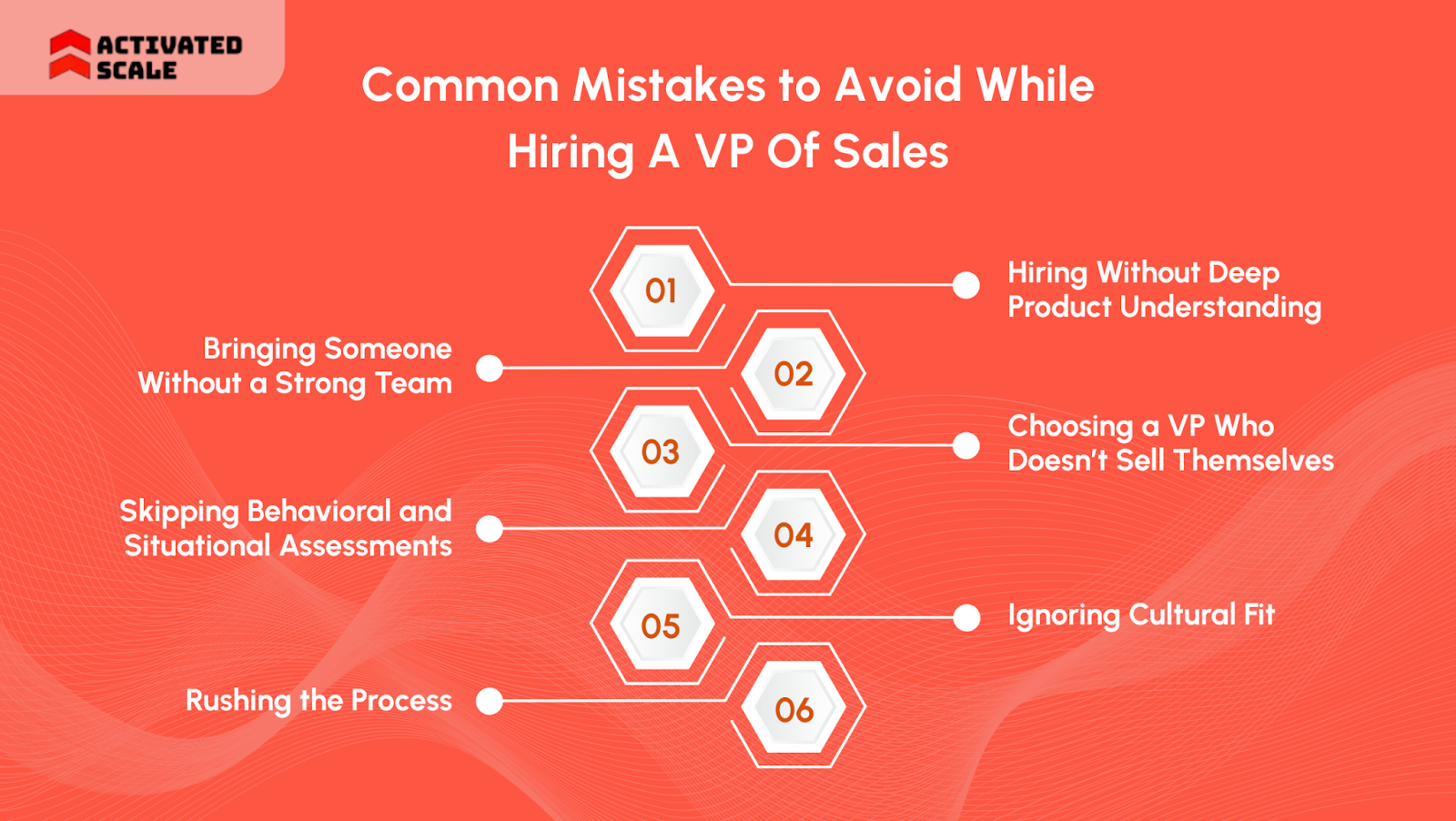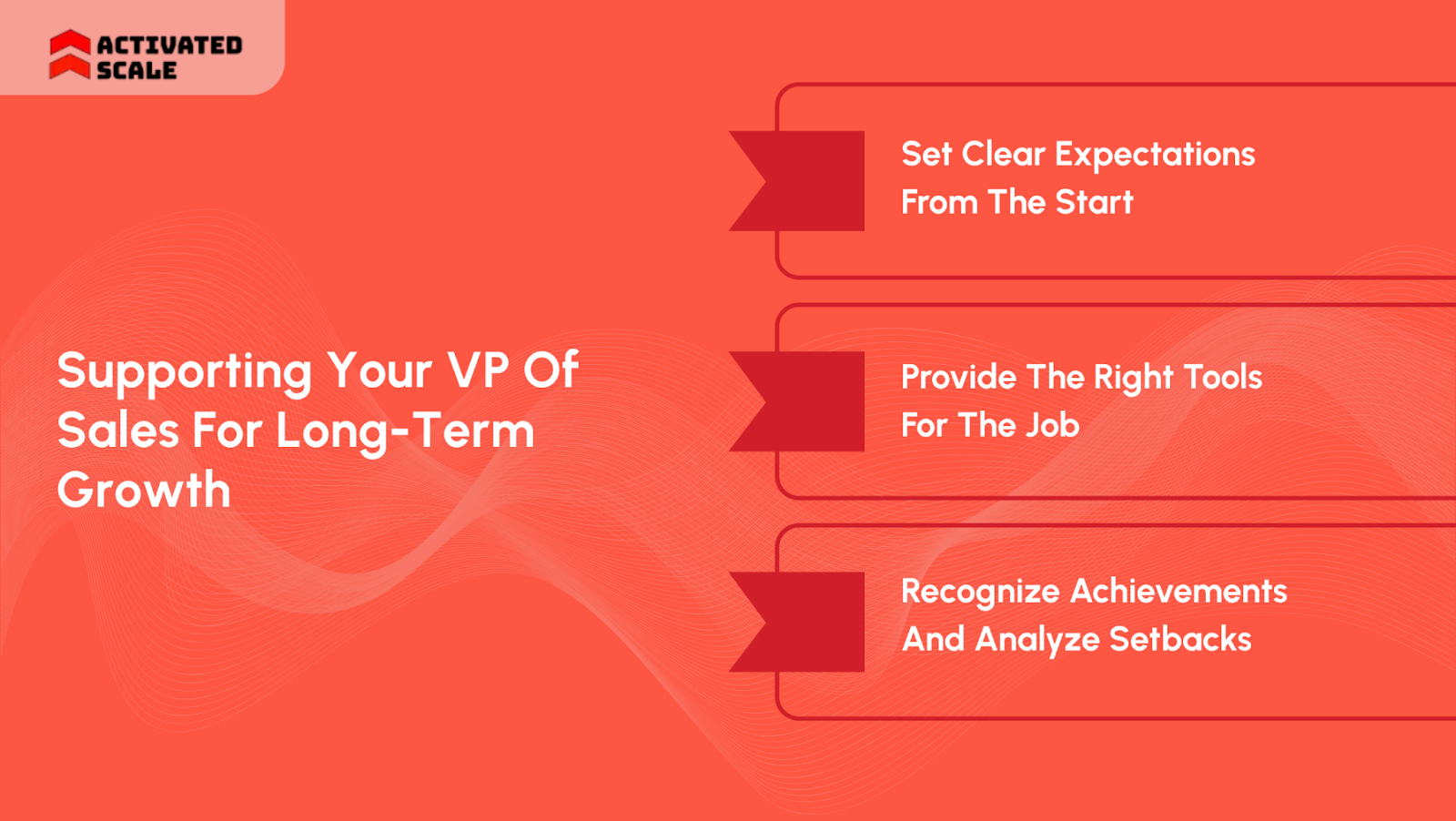Hiring a VP of Sales is a critical milestone for startups aiming to scale revenue and build a strong sales team. This role goes beyond managing day-to-day sales operations; it involves setting strategic direction, creating repeatable sales processes, and leading the team to sustainable growth.
With a VP of Sales in place, startups can accelerate pipeline generation, improve conversion rates, and attract top talent, turning early wins into lasting success. This blog covers why every startup needs a VP of Sales, the key skills and experience to look for, steps to create an effective hiring process, how to set clear performance metrics, and ways to support your VP for long-term growth.
Quick Look
- Hiring a VP of Sales is a crucial step for startups ready to scale revenue and build a structured sales team.
- An ideal VP brings together strategic vision, leadership skills, and a deep understanding of the target market and customer needs.
- A clear, structured hiring process, from defining needs to targeted interviews and role plays, reduces hiring risks and identifies the best fit.
- Setting measurable performance metrics like revenue growth, lead generation, close rates, and quota attainment aligns expectations and drives accountability.
- Ongoing support for your VP through clear goals, tools, collaboration, and feedback fosters long-term success and sales culture development.
Why Every Startup Needs A VP Of Sales

As startups grow, sales can quickly become too complex for founders to manage alone. A VP of Sales brings focused leadership to build a scalable sales operation, freeing founders to concentrate on product and vision.
They set clear strategies, lead hiring and training, and make sure the team hits revenue goals, turning early traction into long-term success. Here are the key reasons a startup needs a VP of sales:
1. Provides Strategic Sales Leadership
Early sales are often a series of one-off deals. A VP of Sales steps back to see the bigger picture. They figure out who your best customers are, the most effective way to reach them, and how to close deals consistently. They turn a scattered approach into a focused plan that everyone on the team can follow.
2. Builds And Manages The Sales Team
Founders can hire the first few salespeople, but scaling a team requires expertise. A VP of Sales knows how to find, interview, and hire talented salespeople. They then train and coach that team, setting performance standards and motivating everyone to do their best work. They handle the management so you don't have to.
3. Drives Revenue Growth
While a founder focuses on the product and overall vision, the VP of Sales concentrates on one thing: driving revenue. They set realistic targets, create a plan to hit them, and hold the team accountable. They are your expert on generating income, which is the lifeblood of any growing startup.
4. Frees Founder Bandwidth
Founders are often pulled into sales calls and deals, which takes them away from building the product and leading the company. Bringing in a VP of Sales hands off those responsibilities to a dedicated leader. This frees up the founder's time and energy to focus on the long-term strategy that only they can drive forward.
5. Analyzes Data And Market Trends
A great VP of Sales uses insights to adapt and improve sales strategies continuously. They constantly look at your sales numbers to understand what's working and what isn't. They also keep a close eye on market shifts and competitor moves. This helps them make smart decisions, adjust the sales approach quickly, and find new opportunities for growth before competitors do.
Also read: Addressing Sales Talent Gaps in Startups Today
Key Skills And Experience To Look For In A VP Of Sales

Choosing the right VP of Sales can make or break a startup’s growth. The ideal candidate brings together strong sales leadership, strategic thinking, and a good understanding of the market. Here are the key skills and experience startups should prioritize when hiring a VP of Sales:
- Sales Strategy & Execution: Capacity to create and execute sales strategies that support business objectives and increase revenue.
- Team Leadership: Experience recruiting, training, and motivating sales teams to deliver strong performance.
- Customer Focus: Deep understanding of customer needs and a talent for building lasting relationships.
- Data-Driven Decision Making: Expertise in analyzing sales data and market trends to inform strategic decision-making.
- Product Knowledge: Thorough knowledge of the startup’s products or services to effectively position them in the market.
- Communication and Negotiation: Strong skills in communicating vision and negotiating deals to close sales and partnerships.
- Adaptability: Thrives in a dynamic startup environment, adjusting strategies as needed to respond to change.
- Cross-Functional Collaboration: Works well with marketing, product, and leadership teams to drive overall company success.
Steps To An Effective Hiring Process
Hiring the right VP of Sales requires a clear, well-structured approach. Startups should focus on defining the role, understanding their sales stage, and putting in place a hiring system that reduces mistakes and finds the best fit. Here are the key steps to follow:
1. Define Your Needs
Before you even write a job description, get specific about what you need this person to accomplish. Are you breaking into a new market? Do you need to build a sales team from scratch, or do you need to manage and grow an existing one?
Pinpoint the main challenges and goals for the first 6-12 months. This clarity will guide your entire search and help you find someone whose skills directly match your company's current situation.
2. Create a Clear Job Description
A generic job listing will attract generic applicants. Your job description should reflect the specific needs you defined. Instead of just listing requirements, describe the actual problems the person will solve and the impact they will have.
Be honest about the challenges and excited about the opportunities. This helps candidates self-select and brings you people who are genuinely interested in what your company is doing.
3. Use Structured Screening
Create a consistent set of criteria to evaluate every candidate. This prevents you from being swayed by a great conversation or a single impressive item on a resume. Use a scorecard to rate applicants on the key skills and experiences you identified as crucial.
A structured approach makes your decisions more objective and helps you compare candidates fairly.
4. Prepare Targeted Interview Questions
Move beyond standard interview questions. Ask about specific situations. For example, instead of "Are you good at building a team?" try "Tell me about the first sales hire you made. What qualities did you look for, and how did you train them?".
These behavioral questions require candidates to provide real examples from their past, which gives you a much better picture of how they might perform for you.
5. Include Case Studies or Role Plays
The best way to understand how someone thinks is to see them in action. Ask a finalist candidate to present a 30-day plan for your sales department or to run a mock sales call with one of your team members. This practical step shows you their strategic approach, their communication style, and how they handle pressure, all before you make a job offer.
6. Onboard Thoughtfully
A great hire can fail without proper support. Their first week shouldn't be about figuring out the printer. Prepare a clear onboarding plan that introduces them to key team members, customers, and your tools. Set clear 30, 60, and 90-day goals so they know what success looks like and can start contributing meaningfully right away.
Finding the right VP of Sales doesn’t have to be difficult. Activated Scale gives you access to top talent ready to drive your startup’s success, part-time or full-time. Contact us to start building your dream sales team today.
Also read: How to Tackle the Challenges in Hiring Remote Sales Talent in 2025
Common Mistakes to Avoid While Hiring A VP Of Sales

Hiring a VP of Sales is one of the most important decisions for a startup. Steering clear of common pitfalls can save you time, money, and headaches in the long run. Here are mistakes startups often make when hiring a VP of Sales, and how to steer clear of them:
- Hiring Without Deep Product Understanding: Don’t hire someone who hasn’t taken the time to truly understand your product before joining. This creates gaps in credibility and sales effectiveness.
- Bringing Someone Without a Strong Team: A great VP won’t start from scratch. Having a few strong sales reps lined up or ready to join is essential for them to hit the ground running.
- Choosing a VP Who Doesn’t Sell Themselves: A hands-off leader who avoids sales work can miss key insights. Your VP should be willing to close deals, especially early on, to understand the market better.
- Skipping Behavioral and Situational Assessments: Avoid hiring based only on a resume and talk. Test candidates with real challenges or case studies relevant to your startup.
- Ignoring Cultural Fit: A misfit may damage team morale. Ensure candidates align with your startup’s values and work style.
- Rushing the Process: Quick hires can backfire. Take the time to vet candidates carefully and involve multiple stakeholders in interviews.
Setting Clear Performance Metrics and Success Criteria
Measuring your VP of Sales’ performance with clear metrics is essential to ensure your startup meets its sales goals. These metrics help track progress, highlight areas needing improvement, and keep everyone aligned on priorities. Choosing the right success criteria also motivates the VP and the sales team to deliver results consistently.
Below are some key metrics to consider:
1. Track The Most Important Number: Revenue Growth
This is the ultimate measure of success. Look beyond total sales and track how fast revenue is growing month-over-month or quarter-over-quarter. A strong VP of Sales doesn't just maintain revenue; they find ways to accelerate it consistently.
2. Measure How Well They Find New Opportunities
A great sales strategy means nothing without a steady stream of potential customers. Track the number of qualified leads the team generates. This shows whether your outreach and marketing efforts are working and ensures the sales team has enough opportunities to hit their targets.
3. Pay Close Attention To Their Closing Rate
This metric shows how effective your sales team is at turning leads into customers. A low close rate might mean the team needs better training, the leads aren't the right fit, or the sales process has a problem. A good VP will work to improve this percentage over time.
4. Shorten The Time It Takes To Close A Deal
Time is money. Track the average number of days from a lead's first contact to a signed deal. A shorter sales cycle means your team can close more deals in the same amount of time, which accelerates revenue. A VP of Sales should find ways to make this process more efficient.
5. Ensure The Team Regularly Hits Its Targets
This metric tracks the percentage of salespeople on the team who are meeting or exceeding their individual quotas. If most of the team is missing their goals, it's often a leadership or strategy issue, not an individual problem. Consistent quota attainment across the team is a key sign of effective management.
6. Gauge How Well They Lead And Develop Their Team
The performance of the entire sales team is a direct reflection of its leader. Monitor overall team metrics like total revenue per rep and rep turnover rate. A VP of Sales who excels at coaching and mentoring will build a high-performing, stable team that gets better over time.
Also read: How to Effectively Manage High-Performing Sales Teams
Supporting Your VP Of Sales For Long-Term Growth

Hiring a great VP of Sales is just the start. To help them succeed over time, startups need to provide ongoing support and resources. Strong collaboration, regular feedback, and clear communication create an environment where the VP and sales team can grow and perform their best.
Here are some ways to support your VP of Sales for lasting success:
1. Set Clear Expectations From The Start
Begin by defining specific, achievable goals for the first 90 days, six months, and first year. Make sure these goals directly support the company's main objectives. Everyone should understand what needs to be accomplished and how success will be measured, which prevents confusion and keeps efforts focused.
2. Provide The Right Tools For The Job
Ensure your sales team has modern technology to work effectively. This includes a customer relationship management (CRM) system to track interactions, communication platforms, and any other resources that support their daily tasks. The right tools remove obstacles and help your team perform at their best.
3. Recognize Achievements And Analyze Setbacks
Take time to acknowledge both individual and team successes. When things don’t go as planned, treat it as a learning opportunity rather than a failure. Review what happened, identify what can be improved, and apply those lessons to future efforts. This approach builds resilience and a culture of continuous improvement.
Also read: Questions to Ask at a Sales Interview
How Activated Scale Can Help You Hire the Best VP of Sales
Finding the right VP of Sales for your startup can be challenging and time-consuming. Activated Scale connects you with vetted, experienced US-based VPs of Sales who can be hired part-time or full-time to fit your needs.
Our flexible approach lets you test candidates for skills and cultural fit before making a full commitment, reducing hiring risks and speeding up your go-to-market efforts. With Activated Scale, you gain access to sales leaders who can build your sales team, craft winning strategies, and drive revenue growth, tailored to your startup’s stage and goals.
Ready to find your ideal VP of Sales and accelerate growth? Get started with Activated Scale to explore top sales talent and start building your dream team today.
Frequently Asked Questions (FAQs)
Q. When should a startup hire a VP of Sales?
Startups should consider hiring a VP of Sales once they have a product-market fit and need someone to build and lead a scalable sales team focused on consistent revenue growth.
Q. What are the essential skills to look for in a VP of Sales for a startup?
Look for strategic sales leadership, team-building ability, data-driven decision making, excellent communication, adaptability, and deep customer focus.
Q. How can startups create an effective hiring process for a VP of Sales?
Define your needs clearly, write a detailed job description, use structured screening and targeted interviews, include role plays or case studies, and have a strong onboarding plan.
Q. What KPIs are most important to measure a VP of Sales’ success?
Track revenue growth, lead generation, close rates, sales cycle length, quota attainment, average deal size, customer retention, and team performance.
Q. How can founders support their VP of Sales for long-term success?
Provide clear goals, access to tools, promote cross-team collaboration, offer continuous training, maintain open communication, and celebrate wins.
Q. How does Activated Scale help startups hire the right VP of Sales?
Activated Scale connects startups with vetted, flexible US-based VPs of Sales that can be hired part-time or full-time, reducing hiring risks and speeding go-to-market growth.
The Ultimate Guide to Hiring a Salesperson!
Get the step-by-step guide to hiring, onboarding, and ensuring success!
_edi.png)




